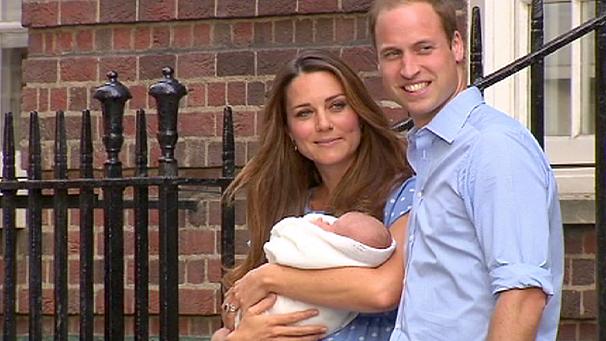British Royal Family
The British Royal Family is the family group of close relatives of the monarch of the United Kingdom. The Royal Family usually include the monarch, the consort of the monarch, the widows and widowers of previous monarchs, the children of the monarch, the male-line grandchildren of the monarch and previous monarchs, and the wives or widows of a monarch's and previous monarch's sons and male-line grandsons.
After 1917, when King George V changed the name of the royal house from Saxe-Coburg and Gotha, members of the Royal Family belong, either by birth or marriage, to the House of Windsor. Senior titled members of the royal family do not usually use a surname, although since 1960 Mountbatten-Windsor (incorporating Prince Philip's adopted surname of Mountbatten) has been prescribed as a surname for Queen Elizabeth II's direct descendants who do not have royal styles and titles, and has also sometimes been used when required for those who do have such titles. Members and relatives of the British Royal Family historically represented the monarch in various places throughout the British Empire, sometimes for extended periods as viceroys, or for specific ceremonies or events. Today, they often perform ceremonial and social duties throughout the United Kingdom and abroad on behalf of the United Kingdom. Aside from the monarch, their only constitutional role in the affairs of government is to serve, if eligible and when appointed by letters patent, as a Counsellor of State, two or more of whom exercise the authority of the Crown (within stipulated limits).

British Royal Family.
Family tree of members

British Royal Family.
Family tree of members
 Prince William and Kate Middleton' marriage.
Prince William and Kate Middleton' marriage.Prince George of Cambridge (George Alexander Louis, born 22 July 2013) is the only child of Prince William, Duke of Cambridge, and Catherine, Duchess of Cambridge. The only grandchild of Charles, Prince of Wales, and Diana, Princess of Wales, he is third in line to succeed his great-grandmother, Queen Elizabeth II, after his grandfather and father.
 Royal baby.
Royal baby.George is baptised by the Archbishop of Canterbury in the Chapel Royal at St James's Palace on 23 October 2013, with Oliver Baker, Emilia Jardine-Paterson, Hugh Grosvenor, Earl Grosvenor, Jamie Lowther-Pinkerton, Julia Samuel, William van Cutsem (son of the late Hugh van Cutsem) and Zara Tindall serving as godparents. The ceremony used a font that was made for Queen Victoria's first child and water from the River Jordan.

